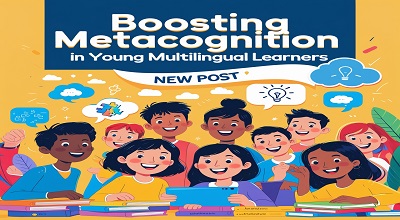Boosting Metacognition in Young Multilingual Learners
Boosting Metacognition in Young Multilingual Learners: In today’s diverse classrooms, young multilingual learners (YMLs) face unique cognitive and linguistic challenges. Developing metacognitive skills—awareness and control over one’s own learning processes—can significantly enhance their academic success. This comprehensive guide explores strategies educators can use to foster metacognition in young multilingual learners, ensuring they become confident, self-regulated thinkers.
Why Metacognitive Skills Matter for Multilingual Learners?
Metacognition plays a crucial role in language acquisition and academic performance. For multilingual children, who navigate multiple linguistic systems, metacognitive strategies help them:
- Monitor comprehension – Recognize when they don’t understand something.
- Regulate learning – Adjust strategies based on task demands.
- Enhance memory retention – Use effective recall techniques.
- Boost problem-solving abilities – Approach challenges methodically.
Research shows that students with strong metacognitive skills perform better academically, making it essential for educators to integrate these practices into their teaching.
Key Metacognitive Strategies for Young Multilingual Learners
1. Think-Alouds for Language Processing
Encouraging students to verbalize their thought processes helps them become aware of how they learn. Teachers can model this by:
- Reading aloud and pausing to reflect – “I don’t understand this word; maybe I can look at the picture for clues.”
- Asking guiding questions – “What strategies can we use to figure out this word?”
2. Goal Setting and Self-Monitoring
Helping students set achievable language and learning goals fosters independence. Techniques include:
- Using checklists – “Did I understand the main idea of the story?”
- Reflection journals – Students write about what they learned and what was challenging.
3. Graphic Organizers for Structured Thinking
Visual tools like Venn diagrams, story maps, and KWL charts (Know-Want-Learn) help students organize thoughts and monitor comprehension.
4. Peer Discussions and Collaborative Learning
Group work allows students to articulate their reasoning, compare strategies, and refine their thinking.
5. Explicit Instruction on Learning Strategies
Teaching specific techniques—such as summarizing, questioning, and predicting—helps students apply them independently.
Challenges and Solutions in Developing Metacognition
While metacognitive training is beneficial, educators may face obstacles:
- Language barriers – Simplify instructions and use visuals.
- Cognitive overload – Break tasks into smaller steps.
- Cultural differences in learning styles – Incorporate culturally responsive teaching.
The Role of Teachers and Parents
A collaborative approach between educators and families strengthens metacognitive development. Parents can:
- Encourage self-questioning – “How did you solve that problem?”
- Provide multilingual resources – Books and games in both native and target languages.
Conclusion
Fostering metacognitive skills in young multilingual learners empowers them to take charge of their learning. By integrating structured strategies, reflective practices, and supportive environments, educators can help these students thrive academically and linguistically.
